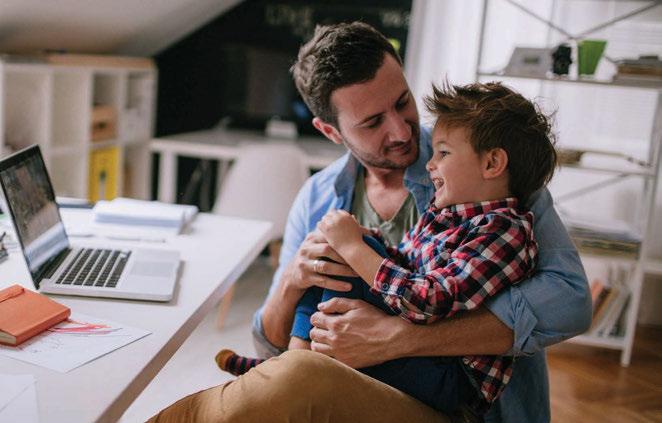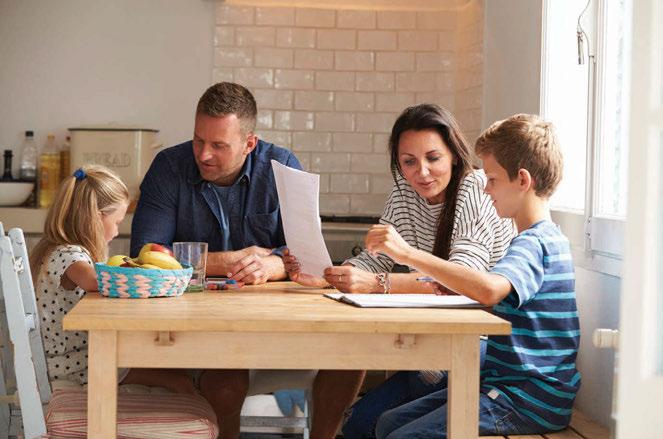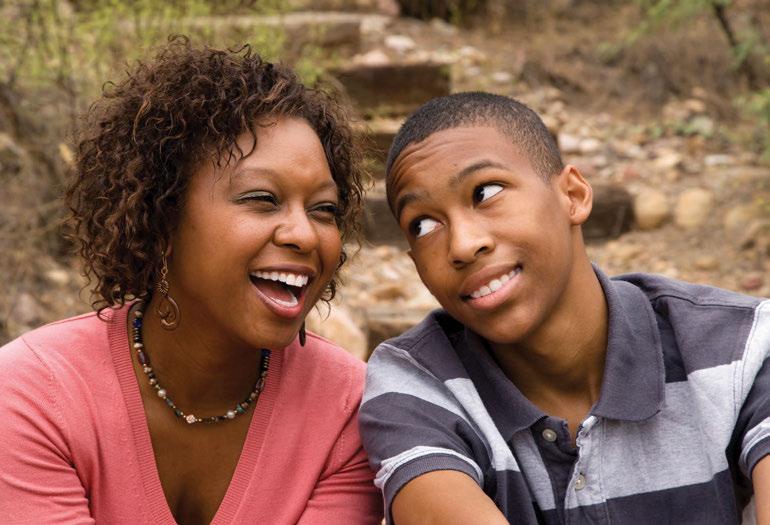
12 minute read
SECTION 4: HOW DO I TALK TO MY CHILD ABOUT DRUGS? 38
Some parents find it difficult to talk with their children about drugs and alcohol. But it is important to teach them about these substances and about your expectations if they are offered drugs. These conversations are not a one-time event. Start talking with your children when they are young; continue as they grow older and their level of interest and understanding changes. Your willingness to talk (and listen) tells them you care about what they are interested in, and it provides you with insight into their world.
A big part of talking is listening. For example, ask your kids what they know about marijuana. Ask if they think alcohol is dangerous. Ask what they think can happen if someone takes heroin. Their attitudes are important because if they think a particular drug is dangerous, they may be less likely to use it; if they think a drug is harmless, they may be more likely to use it. It is up to YOU to tell your children that tobacco, drugs, and alcohol have serious health and social effects.
Advertisement
At some point, your child will likely ask if you have ever taken illicit drugs. If your answer is NO, explain how you avoided the temptation and what opportunities being drug free provided you. If your answer is YES, explain why you do not want your child to use drugs even though you did. You do not need to confess everything you have ever done, but explain honestly what attracted you to drugs and why you want your child to avoid making the same mistake. You might say things like:
■ “I smoked pot to fit in, but now I know how dangerous it was. If I could do things over, I never would have tried it. I hope you don’t either.”
■ “Drugs were illegal then just like now, and there are serious consequences for getting caught. I would hate for you to ruin your future.”
■ “I tried drugs, but I felt like I was losing control over them and could not stop. I finally quit, but it was hard to sustain my recovery and avoid drug use. I hope you never try them—any of them.”
■ “It may seem that most kids your age use drugs, but that isn’t true. Also, substance use can lower your chance of success at school and in the workplace.”
This section suggests ways to talk with children at various ages. Although divided into preschool, elementary, middle, and high school, the age range of students in these grade levels may differ in your area. Also, children do not necessarily develop at the same pace, and drug issues vary among communities. Use the suggestions most suitable to your child’s maturity level and environment.
4 Suggestions For Talking To Preschoolers
Young children ask many questions. Your response lets kids know you can be trusted to provide honest answers. Throughout early childhood— even when a child enters preschool or attends day care—the family plays the most important role in their development.39

Do not worry that you will give your child ideas about taking drugs or tempt them to experiment. They likely already know how important prescription medicine is and may even remember you giving them some if they were ill. The early attitudes they form help them make healthy decisions when they are older. Talk often with preschoolers, and listen to what they say.

1. Young children mimic adults, so use every opportunity you can to share your feelings about substance use. When you see someone smoking, for example, tell your child that tobacco is bad and that it can cause people to get very sick and die.
2. Teach on their level. Children this age will listen as you explain that things like cleaning products or paint have unsafe ingredients in them. Caution them never to take a drug unless you, a grandparent, or a caregiver gives it to them.
3. Preschoolers have short attention spans, so give short, honest answers. If you occasionally enjoy a beer on the weekend and four-year-old Jimmy wants to taste it, try to interest him in something else by saying, “No, this is only for adults. It can make children very sick. Let me pour you some juice instead.”
4. Teach them to make their own good choices. If they love a fictional character or famous athlete, encourage them to eat healthy foods so they will grow up to be strong like their idol. Also, let them make decisions (for example, what to wear to preschool) that build confidence in their ability to do so.
5 TIPS FOR TALKING TO ELEMENTARY SCHOOL STUDENTS (6–10 YEARS OLD)
Children this age are anxious to learn. You can talk to them about the consequences of using substances, such as how it can lead to misuse and a substance use disorder. You can continue to teach and encourage good choices around healthy living.
1. Explain about good drugs versus bad drugs. Let them know that children should only take prescription medication when the adult in charge tells them to. Be sure they understand that even good medicine can make you sick or kill you if it wasn’t prescribed for you or you take it for the wrong reason (to get high).
2. Repeat your message regularly. Remind these youngsters that some drugs can cause severe brain damage or cause people to die. Explain how even small amounts of alcohol can make children sick and harm their growing brain, making it harder for them to learn and remember things in school.
3. Children crave praise, so give it out freely when deserved. For example, let them know they are super smart for disliking the smell of cigarettes and that you trust their ability to make good decisions.
4. This is a good opportunity to involve others in your efforts. For example, as your child enters elementary school, offer to help with a school activity or drug education event or program that has an anti-drug or “no tolerance” message.
5. If your child does not start conversations about drugs and alcohol with you, take the lead. Begin discussions using real-life events in the news or in your own lives. This is true no matter your child’s age. For example, your child tells you that a friend named Kevin rode in a car driven by his older brother and that the brother was smoking marijuana while driving. Talk about the importance of not riding in a car with someone who is using drugs, and explain what to do in that situation. You might say, “Kevin’s brother did something illegal, and he could go to jail or have a serious accident. I hope you know you can call me if someone you are riding with is drinking or using drugs. I will come and get you day or night.” You could add, “You’ll be driving in a few years, and I’m glad you are smart enough not to drink or do drugs and drive.”
7 WAYS TO TALK TO MIDDLE SCHOOL STUDENTS (11–14 YEARS OLD)
Starting middle school (or junior high) is a big step. If you began talking with your children about drugs and alcohol at a young age, they know how you feel and they have information. If you did not start earlier, this is a great time to begin. Your child may already be experiencing stressors that can lead to substance abuse.
This is also an important time to listen, observe, and check in with other parents.
1. As with children at earlier ages, encourage your children to share their dreams. Ask what activities they enjoy and help them nurture those interests in positive ways, such as participating in art, music, sports, community service, and academic clubs. Talk to them about making good choices, living healthy, and setting goals.
2. At this age, young teens (especially girls) start to care more about how they look. Remind them that it is normal for their bodies to change. Find healthy ways to help boost their confidence and manage stress, but remind them how activities like smoking cause bad breath and stinky hair. If your children are interested in sports, talk to them about how staying healthy can help them perform better than a “quick fix” like anabolic steroids.
3. Friends become very important at this age, so get to know your children’s friends. If you drive them somewhere, for example, you can listen in to learn current issues and trends, as well as learn how your child interacts with others. If your child struggles socially or seems drawn to an unhealthy peer group, try to determine why. Get to know their parents, too, and share with them your desire to raise a drug-free child.

4. When you have talks with your children, you can suggest role-playing to help them practice what they can say or do if someone offers drugs or alcohol to them. “Man, that stuff is really bad for you!” Or “My mom will kill me if she finds out I drank a beer!”
5. Tell your children often that you will come get them any time if they need to leave a place where alcohol or drugs are being used. Promise them they won’t get in trouble for calling you. If you can’t be available, find a responsible adult who will go in your place. Discuss with them what they would do (or should do) if they saw alcohol or substance use at a party.
6. Remember, it is important to talk but it is also important to listen. You may have to ask questions that require more than a simple “yes” or “no” answer. Use movies, song lyrics, or real life events as topics. For example, “In that movie last night, the girl drank beer even though she was pregnant. Do you think that might affect her unborn baby?” Or “My friend’s 14-year-old son got busted for pot and is going into a treatment center. What do you think that will be like?”
7. You might have to assume the role of a teacher. For example, your kids may think it is okay if they only drink but stay away from drugs. Discuss with them the risks of using all kinds of substances, including alcohol. Also, teach them how to find credible information on websites like www.justthinktwice.com and https://teens.drugabuse.gov, which were developed for teens and young adults. You can even require that they visit these websites and report what they learned before they go to their first party.
8 TIPS FOR TALKING TO HIGH SCHOOL STUDENTS (15–18 YEARS OLD)
By this age, most youth have had many opportunities to try drugs, alcohol, and tobacco. Even if they didn’t use, they have probably seen others do it, sometimes to excess and perhaps with serious consequences. They may even know young people with substance use disorders. You can’t choose their friends. You can only help create opportunities for healthy choices around friends and activities that do not involve drinking, smoking, or drugs.
1. Teens this age typically understand what can happen if they use drugs. As they think about their future, remind them that substance use can shatter their dreams. It can negatively affect their chances of getting into college, joining the military, or being hired for some jobs. Encourage them to continue involvement in activities they enjoy, as discussed in the previous section on ways to talk to middle school students.
2. Your children may try to lure you into a debate about marijuana use for medical or other reasons. Make sure your child knows that marijuana use in any form is illegal for youth, has harmful effects on the developing teen brain, and federal law prohibits it.
3. Teens want independence but still need appropriate limits. Have them help you set those limits (such as curfews). Also, ask them what consequences they think are fair for breaking the rules. Consistently follow through if rules are broken, and don’t simply give up when they push back. They are testing the boundaries and this is normal.
4. Tell your children often that you care about them and that they are important to you. Show them you mean it by regularly spending one-onone time with them. A strong bond will make your child more likely to come to you with questions or concerns about drugs, alcohol, or other issues. Even as they push for independence, they want someone they love and respect to pay attention to them. They need YOU!

5. Know what’s trending. The Drug Identification Chart at the end of Section 2 shows you some (but not all) commonly misused and abused substances. New drugs show up all the time, and what’s popular in your community may not be in the chart. Ask your teen about drugs that are an issue at their school, in friends’ homes, and at parties.
6. Sometimes teens beg parents to let them drink at home, saying it is safer. Do not let them, and do not let your child host a party in your home where alcohol is served. Doing so would show that you approve of underage drinking. Also, you could be held responsible for anything that happens to minors who drink in your home—even what happens after they leave your home.
7. As with kids at any age, praise them for making good choices. If they know you are proud of them, it can motivate them to stay drug free.
8. Parenting does not stop when your child goes to college. Find out if there is a program for freshmen that covers the school’s drug and alcohol misuse prevention policies, programs, and services. If so, attend with your child; if not, find out who is responsible for providing that information and go with your child to obtain it. Ask about whether their drug misuse prevention programs are evidence-based. Be sure your child knows the legal and school penalties for actions like driving under the influence of drugs or alcohol, underage drinking, illegal drug use, and using a fake ID.
Conversation Starters
Talking to your kids about alcohol, tobacco, and drugs is not hard. The following opportunities can serve as teaching moments:

■ If you see a young person smoking, talk about the negative effects of tobacco.
■ If you see an interesting news story, discuss it with your child. Did a driver who was drinking run over and kill someone? Did a young couple who did drugs lose custody of their children? Ask how your child feels about situations and the potential consequences.
■ While watching a movie or TV show with your kids, ask if they think it makes tobacco, alcohol, and drugs look cool.
■ If you read or hear about someone affected by substance use, remind your child that preventing drug use is important but that some people develop substance use disorders. Also, discuss the importance of treatment and supporting people in recovery from their substance use disorder.
FAMILY CHECKUP: POSITIVE PARENTING PREVENTS DRUG ABUSE
Parents play an important role in preventing their children from starting to use drugs.40 The National Institute on Drug Abuse (NIDA) provides a parenting resource called Family Checkup: Positive Parenting Prevents Drug Abuse (www.drugabuse.gov/familycheckup). This resource provides five questions that build parenting skills to help prevent drug use. Video clips on the website show positive and negative examples of these parenting skills.
Parents play an important role in preventing their children from starting to use drugs.
Why You Should Talk With Your Child About Alcohol41
■ The chance that children will use alcohol increases as they get older. About 10 percent of 12-year-olds say they have tried alcohol. That number jumps to 50 percent by age 15. The sooner you talk to them, the more chance you have to influence them.

■ Parents play a critical role in a child’s decision to experiment with alcohol. About 80 percent of children feel that their parents should have a say in whether they drink alcohol.
■ Talking to children before they drink is best, but any time is better than no time. If you are direct and honest, they are more likely to respect your rules and advice. It is never too early to talk to your children about alcohol.
DOS AND DON’TS WHEN TALKING WITH KIDS ABOUT DRUGS OR ALCOHOL42
DO explain the dangers using language they understand.
DO explain why you do not want them to use the substance(s). For example, explain that substances can mess up their concentration, memory, and motor skills and can lead to poor grades.
DO be there when your child wants to talk, no matter the time of day or night or other demands on your time.
DON’T react in anger—even if your child makes statements that shock you.
DON’T expect all conversations with your children to be perfect. They won’t be.
DO believe in your own power to help your child grow up without using alcohol, tobacco, or other drugs.
DO praise your children when they deserve it. This builds their self-esteem and makes them feel good without using drugs or alcohol.
DON’T assume your kids know how to handle temptation. Instead, educate them about risks and alternatives to temptation so they can make healthy decisions.
DON’T talk without listening.
DON’T make stuff up. If your child asks a question you can’t answer, promise to find the answer so you can learn together. Then follow up.




